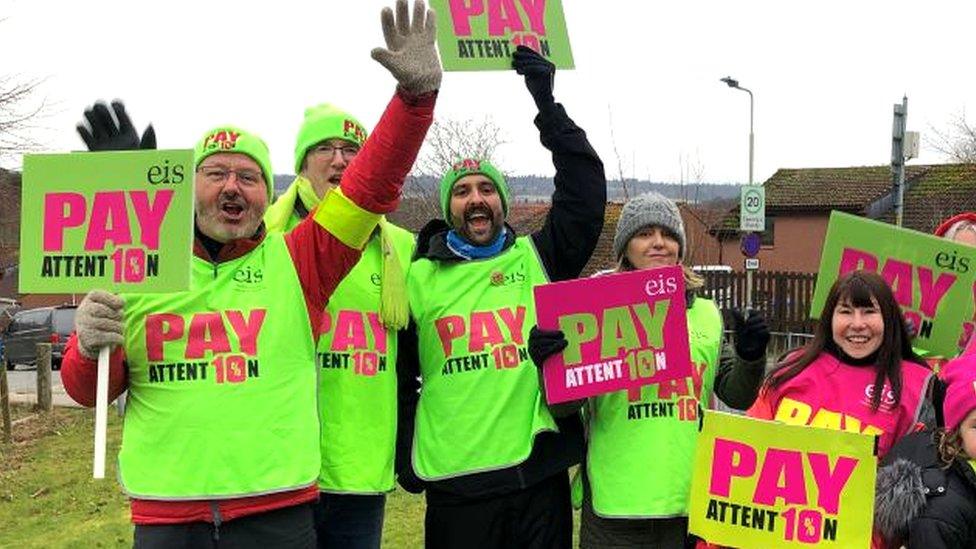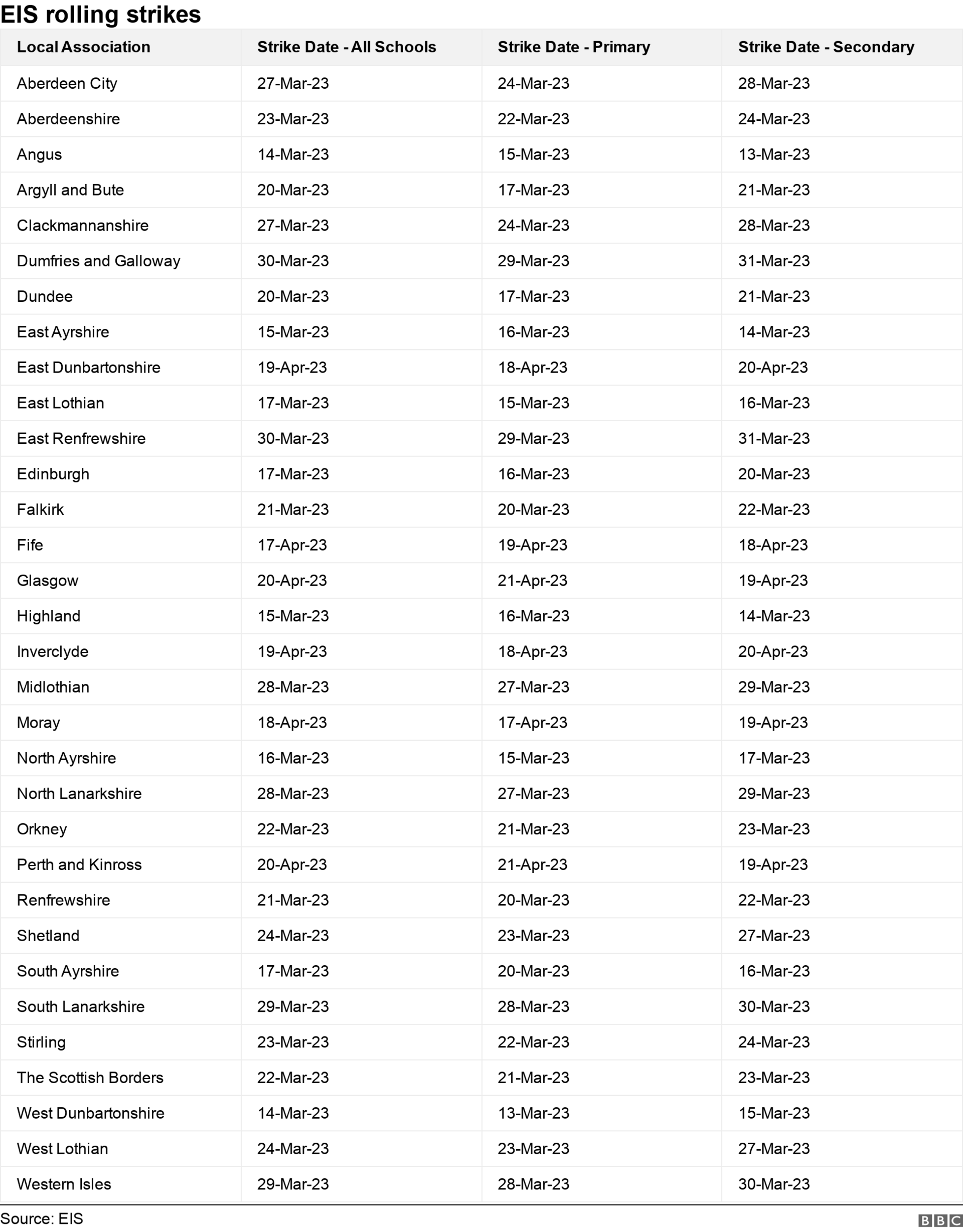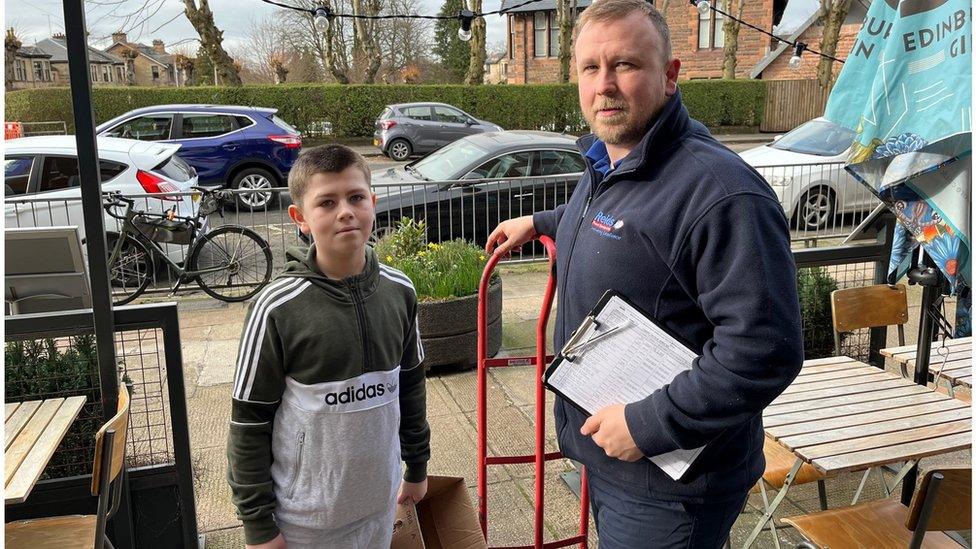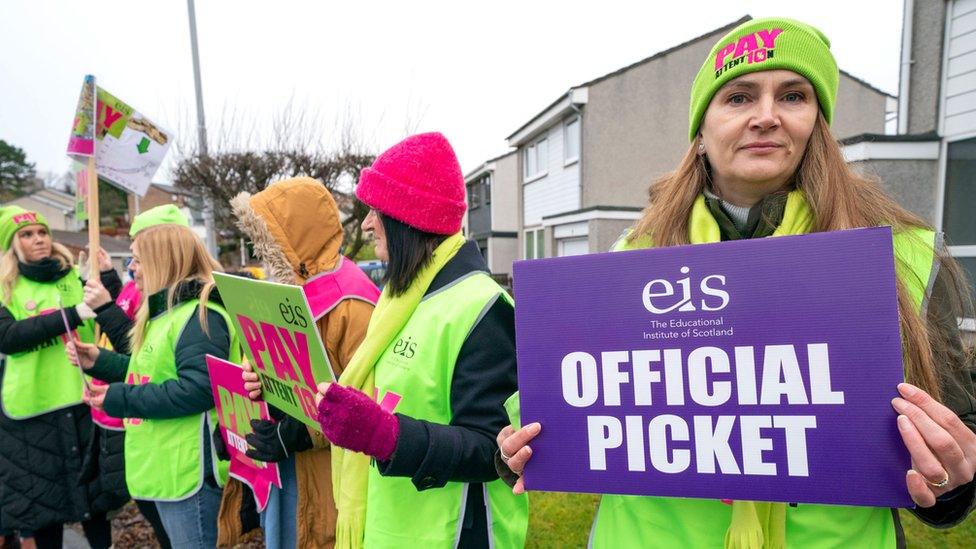School strike: EIS announces dates for 20-day rolling strike
- Published

Teachers on the picket line at Charleston Academy, Inverness
The dates for a further 20 days of rolling strikes have been confirmed by Scotland's largest teaching union.
The Educational Institute of Scotland (EIS) has confirmed when each local authority's members will strike in March and April.
Each of the 32 council areas will be targeted.
All schools will be hit by strikes on two days - one where all schools will close and one each for primary and secondary schools.
Teachers' unions want a 10% pay increase but the Scottish government says their demands are unaffordable. The pay dispute has been running for more than a year.
The EIS said it held "useful talks" with the government on Tuesday afternoon.
While no new offer was made, discussions will resume with Deputy First Minister John Swinney and Education Secretary Shirley-Anne Somerville on Wednesday to try and resolve the dispute.
The new strike dates were released on day one of a two-day walkout.
Almost every state primary and secondary school in the country is closed in the 48-hour strike.

By the end of this week, many pupils will have lost at least five days of schooling to the industrial action, which began in November.
Pupils in the constituencies of senior politicians have been worst affected. Targeted strike action by members of the EIS last week closed schools for three additional days.
The same areas, which include those represented by First Minister Nicola Sturgeon and her deputy John Swinney, face another three days of strikes next week.
Shirley-Anne Somerville said she was "desperately disappointed" that the EIS had not suspended its strike action as talks continued.
"It's the children and young people's education that's suffering," she told BBC Radio's Good Morning Scotland programme.
Five offers have now been put to teachers, she said.

Almost every school in the country is closed in the 48-hour strike
"We are trying our very best to find a compromise and resolution to this," she added. "The fifth offer was fair and has to be affordable for the government. But the EIS rejected it without even taking it to members."
Ms Somerville said she was committed to working with the unions and had offered to meet every day this week.
Teachers were offered a pay deal worth 11.5% in total over two years. This included a 6% rise for 2022-23, backdated to last April, and a 5.5% increase for 2023-24.
The offer also raised the cap on the maximum rise from £60,000 to £80,000 per year, which only affects a small number of the best paid in the profession, including some headteachers.
A majority of members of the Scottish Secondary Teachers' Association (SSTA) and Association of Head Teachers and Deputes Scotland (AHDS) unions were prepared to accept the offer.
But it was turned down by the EIS and the NASUWT union, whose members will also be on strike on Tuesday and Wednesday.
The 11.5% offer across two years has now lapsed and unions are hoping to receive an improved deal.
But the Scottish government has repeatedly said demands for a 10% increase are "unaffordable".

'I have to take my son to work'

Jamie Docherty has to take his son Leo on his delivery runs while the schools are on strike
Jamie Docherty is a delivery driver from Dalry, North Ayrshire. He told BBC Radio Scotland Drivetime presenter John Beattie that he is having to take his son Leo with him as he works, due to the disruption caused by the strikes.
"He is out with me today because there is nobody to watch him," he said. "It's not exactly what I would want. I would rather he was in school, and I am sure he would too.
"He needs to come out with me tomorrow too. There's no other option.
"Everybody needs to do what they need to do - I just wish there was a way to work stuff out.
"I see where the teachers are coming from but it has an effect on everything around about."

Andrea Bradley, the general secretary of the EIS, said members remained "absolutely resolute in their determination to secure a fair pay settlement" from the Scottish government and council organisation Cosla.
She said report for the action remained strong, with more teachers on picket lines and a "significant number" of new applications for union membership.
The dispute would only be settled by "appropriate negotiations", Ms Bradley added.

Strike action has targeted the constituency of Education Secertary Shirley-Anne Somerville
Patrick Roach, general secretary of the NASUWT, said his members' decision to reject the revised pay offer and continue industrial action reflected "the level of anger and frustration towards ministers and employers at their refusal to offer teachers a real-terms pay rise".
"Teachers feel taken for granted by the Scottish government and Cosla who seem to expect them to be satisfied with yet another year of pay erosion as their workloads become steadily more demanding," he added.
The schools targeted in specific areas last week face a further three days of action from 7 March if the dispute is not settled.
Those were in the constituencies of Nicola Sturgeon (Glasgow Southside), John Swinney (Perthshire North), Education Secretary Shirley-Anne Somerville (Dunfermline) and the East Dunbartonshire Council area of Scottish Greens education spokesperson Ross Greer.
The action will also target the ward of Dumfries and Galloway councillor Katie Hagmann, the resources spokesperson for Cosla.


When teachers staged their first national strike since the 1980s in late November, few expected they would still be striking now.
Teachers had hoped the mere threat of a strike would lead to a big improvement in the pay offer. But that hasn't happened.
Today will be the fourth day off for most pupils but some have faced more disruption.
The dispute appears no closer to resolution.
SSTA members are not taking part in this strike - in a consultation, they voted by a narrow majority to accept the most recent pay offer. The AHDS is also not on strike.
But that 11.5% pay offer is no longer on the table. In teachers' pay negotiations, the unions work jointly. The EIS - which is by far the biggest union - and the NASUWT rejected it.
Much depends now on when a new pay offer might be tabled and what it might be like. When one comes, will it be enough to get the EIS and the NASUWT to suspend action?
Otherwise all students face four days off school by the middle of April and some face seven.